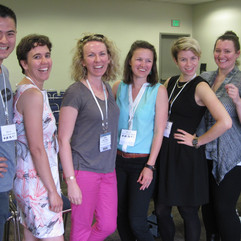I'm convinced: the ultimate genius is working together. (Images by B.G. Merkle, of people I've collaborated with.)
A few weeks ago, I received a major professional award. I have felt conflicted about it ever since I learned (about a month earlier) that I had been selected. I detailed some of the reasons why this award feels fraught here.
My close friends and collaborators have done a lot of listening (thank you!) as I've processed why I feel so conflicted about this award. The real truth is that this work wouldn't have happened if I (and we) waited for an award or any other validation that the work we were doing was important. The organization that issued this award has been tolerant of our efforts within it, but never embraced the work or funded it in a substantial way. And, there's no funding, no speaking circuit, no project or initiative associated with this award. Likewise, my university has not prohibited my work, but hardly invested in it. Getting this award won't change the terms of my job description, get me equitable pay or resourcing, or increase my job stability. So, even though this award is a really big deal, it's hard to see a way to leverage it toward the kind of "make the world a better place" that we've been striving for all this time.
And, as I say these things out loud, or write them here and elsewhere, I become increasingly frustrated by this reality. If this award doesn't change anything, why does it exist, then?!
I don't have an answer to that question, because I'm not the one who awards the award. For weeks, it has bothered me intensely that I am hung up on the answer to that question. If I didn't care the whole time I was doing all this work that got awarded, then why do I care now!?
After weeks of spiraling around in my consternation about it all, a conversation with one of my dear collaborator friends helped me realize I was hung up on the wrong question. Why the award exists isn't answerable. And I'm not answerable to it.
Instead, I will focus on my why.
It might seem simple or pat. But, I did work that was ultimately recognized by this award because of people. The root of it all is that I fall in love easily, wholeheartedly, even obsessively, with great ideas and passionate people willing to work for change.
As I've written all over this site, my personal experience affirms that people can change, and that together, we can make our classrooms, communities, and institutions a better place. This certainty comes from my spectacular good fortune, over the past ~20 years, to work with a lot of brilliant, dedicated people who could both imagine a better world and conceptualize how to make things materially better in their sphere of influence. [1]
My experiences working intensely to enhance my communities and work environments have ranged from saving a community garden slated to become a university parking lot to teaching people how to keep their chickens from becoming bear bait. I've worked with people who gave up all their free time to keep a tool library functioning, or invested their energy in supporting refugees through urban gardening, adults with literacy support, and sustaining and celebrating a minority-language newspaper into its 250th year.
In every one of these instances, we did what Cecile Richards advocates: “Don't sit around and wait for the perfect opportunity to come along — find something and make it an opportunity.”
I cared a lot about all these efforts; that's why I dove in.
But the real truth is that I was head-over-heels for the people who made these programs happen.
For example, when I met the amazing people who co-founded the ESA Communication and Engagement Section (C&E Section) with me, I couldn't wait to spend time with them. We saw a lot of potential and need for change in ESA to support professionals like us whose expertise was totally overlooked at the time. We channeled Rebecca Solnit's framing of hope as a verb, hope as action -- not naive belief that better is inevitable, but that we can change things for the better. For years, we had monthly (or more-frequent) meetings, as I built an ever-expanding website to host the suite of resources and programming we developed to foster and enhance scicomm skills (and values) in our fellow ESA members. We also slogged uphill against a lot of gatekeeping that (largely) kept us out of the upper levels of ESA leadership. So we pivoted to work that we could do. [2]
All that work was important and made a real difference. For example, ESA members regularly told us that they had felt there was nothing in ESA for them after completing their graduate work. But now, with the C&E Section active, they felt there was still a place for them in the organization. [3]
I've been part of meaningful changes like this again and again, thanks to the awesome humans I've been able to work with. So many people made the UW Science Communication Initiative a reality. [4] My co-founder of Meteor SciComm is the reason why I am thrilled every week to work on our podcast, programming, and any possible lead for funding to take our ambitious, scicomm-field-serving ideas to the next level. In my department, colleagues and students have been extraordinary collaborators as we work to make our classrooms and the department as a whole more supportive for everyone [5]. And, I've worked closely for the past several years with a remarkable cadre of collaborators on some systems-change grant proposals and papers that have the potential for major impacts on how we conceptualize, talk about, fund, value, and provide training for people looking to share science [6]. Finally, there are some vital friends in my life (some local, some long-distance) who are also working in their own spheres for important growth and change. When we get together in-person or online, we bolster, celebrate, name the problems, and reinvigorate each other.
I am 100% certain that this work matters. But, I'm also totally confident that I wouldn't have started it, stuck with it, or helped any of it happen at the exceptional levels of quality and impact that we've achieved if (a) I'd attempted this work alone or (b) there hadn't been brilliant (and I mean that genuinely, no hyperbole), dedicated people working on these efforts, too.
There's the whole "two heads are better than one" truism, sure. And also, at least in my experience, collective effort makes hard work more meaningful, more possible, and more impactful. Working with other people who care, have their own unique knowledge of the world, and can share in solution-making means that I've had people to dream and scheme with, people to rant with, people to commiserate with, people to validate that there are problems and that we can solve them.
How does this apply to anyone else?
Angela Davis said, “You have to act as if it were possible to radically transform the world. And you have to do it all the time.” In my experience, this has been possible and sustainable when I worked with others.
So, if you're trying to change something, build something, or make something better, and you're feeling stuck, daunted, or the like -- try finding someone to work on it with you. Don't sink yourself thinking you need to be a rugged individual who has the fastest gun at high noon. The myth of all that nonsense unravels the mutualism we need for a better society and a resilient planet. “Leadership does not have to be individualistic… it can be collective," Angela Davis also said. Let's keep working together, so that we can sustain the momentum and solidarity this work requires.
NOTES
[1] Well...that certainty was solidified by my professional experiences. But, I first learned that working together could lead to positive change thanks to my mom and the many community volunteer projects she signed me and my sisters up for (e.g., traipsing the whole town with fellow 4-Hers, to make sure that every house in town had house numbers useable for emergency responders; leading the community's annual food drive in middle school). These experiences led to my lifelong volunteerism which was at full-throttle during college. where amazing mentors gave me full rein to build and do and lead things that I could imagine but had no previous "credentials" to assure I could pull off. I created an alumni organization and a sustainability nonprofits collective, I developed a place-based/field journal curriculum, and started training people to draw in the out-of-doors, and a host of things that I didn't "know" how to do but learned how to do in the great company of other folks making things up in important ways. These experiences led to my early jobs where I worked for pennies, effectively still volunteering, to enhance my community. In each of these settings, I was surrounded by fellow humans who gave a shit, showed up, worked together, and helped make the community not just better, but awesome. The outcome is that I both believe we can do better and understand how that doing better can happen. And it does not happen by accident or merely through good intentions.
[2] We didn't need access to or permission from upper-level ESA leadership to:
run a multi-year interview series featuring professionals doing all sorts of scicomm that I co-edited;
develop and edit a series in ESA's journal of record that highlighted all the vital human dimensions work being done by various sections;
launch a Communicating Science section (which I edited for several years) in that same ESA journal,
establish a pair of annual scicomm awards,
and run a weekly scicomm resource blog.
[3] As another example of impact, the first year we started the C&E Section, we scoured the ESA annual meeting's program for anything that looked like scicomm and issued a list of all those sessions so people could find them. There were 20 in 2015. We maintained a list like this every year. In 2019, there were 51+ (not counting posters/talks, which we didn't have the bandwidth to track.) By 2021 (and even though that was a virtual meeting), there were 43+ scicomm-related sessions. ESA staffers by then saw sufficient value in it that they took over making the list. And, in the past year, I've been told that by two top-level staffers that my advocacy for professional development for experienced professionals and payment to scicomm members for their expertise have had long-term impacts on how ESA staffers run and fund programming.
[4] Speaking of impact, WySCI has made a substantial difference at UW, too! Here's just one perspective on that.
[5] See, for example: Barrile, G. M., R. F. Bernard, R. C. Wilcox, J. A. Becker, M. E. Dillon, R. R. Thomas-Kuzilik, S. P. Bombaci, and B. G. Merkle. 2023. “Equity, Community, and Accountability: Leveraging a Department-Level Climate Survey as a Tool for Action.” PLOS One 18 (8): e0290065. https://doi.org/10.1371/journal.pone.0290065
[6] These other efforts are fueled by another vital observation from Angela Davis. She wrote, "It is in collectivities that we find reservoirs of hope and optimism.” And, that's what's fueled a lot of my work:
My forthcoming book with Stephen Heard: Helping Students Write in the Sciences: Strategies for Mentoring Early Career Writers, a work of "translation" to help faculty and other mentors in STEM access and use the decades of research on effective writing instruction available through fields such as Rhetoric & Composition and Writing Studies
A department-wide climate survey, published as a tool to help others looking to inform their efforts to enhance their departments
IMPACT — Innovative Methods to develop Adaptive Capacity through Transdisciplinarity - a university-wide research project I co-led to scope out barriers to impactful scholarly work
Meteor: The (Overly) Honest Podcast about Scicomm with Impact, which I co-host with Virginia Schutte
SciComm LIFT: Learning Inclusive Forms of science communication through evidence-based Training - my core research program, with several major, collaborative components; all focused on systems change to enhance training, recognition, awards, and resourcing for scicomm
SciComm STEP: Sparking Transitions for Experienced Professionals, which I also co-lead with Virginia
Scholarly Writing Practices, a mindset intervention/support program for developing writers at the graduate level (co-run with Rick Fisher)
UW-MENTOR: Mentoring toward Equitable, Novel & Transdisciplinary Outcomes of Research - a program I'm working to secure funding for right now, to equip faculty to be better mentors
This is the end of this post. If you see a prompt to subscribe, you're welcome to do so! Your paid subscription helps me allocate time to the resources I share here.















